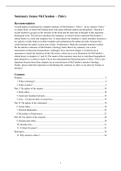Summary
Summary Ethics - James Wm. McClendon Jr.
- Course
- Institution
- Book
I would highly recommend my complete summary of McClendon’s “Ethics”. In my opinion “Ethics” is a dense book, in which McClendon deals with many different authors and disciplines. Therefore I myself needed to get grip on the structure of the book and the main line of thought of this impor...
[Show more]




